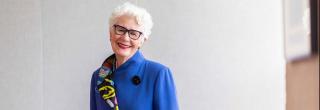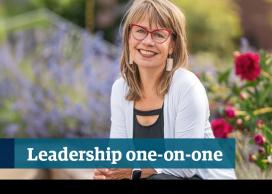Moura Quayle is UBC’s Vice-Provost and Associate Vice-President, Academic Affairs. She is also a professor and the founding director of UBC’s School of Public Policy and Global Affairs, the former director of the Liu Institute for Global Issues and currently teaches in the Master of Public Policy and Global Affairs program: Leadership for Policy Professionals.
In addition to her academic career at UBC Vancouver, Moura acted as Deputy Minister of the B.C. Ministry of Advanced Education, B.C. Commissioner of Pacific Coast Collaborative, Dean of UBC’s Faculty of Land and Food Systems, and Associate VP, Academic Programs at UBC Okanagan.
Her book, Designed Leadership, was published in 2017, and more recently, she co-edited a book written by her late husband, David Fushtey, entitled Principled Governance when Everything Matters (2021). Her interests include learning Mandarin, Chinese calligraphy (shufa) and painting in various media.
Q1. What quality do you most admire in a leader?
The quality of being a continuous learner and continuing to dabble in wonder – you should always strive to learn something new, ask questions, and stay curious.
Leaders also have to be comfortable with ambiguity. You need to get used to making decisions knowing full-well that you won’t always have all of the data. Ambiguity in decision-making is an inevitable part of any leadership role, and so it must become part of your creative process.
Q2. What makes you laugh?
Pretty much everything! I think I laugh quite a lot, often because life is full of unusual connections and silly or bizarre occurrences. My sense of humour is tuned into people telling stories about their lives, with a little bit of absurdity or self-deprecation thrown into the mix.
Q3. Who inspires you, and why?
My first choice is Dave, my late husband. He was so wise and insightful when it came to almost everything. He was a renaissance man with broad talents and expertise in a variety of areas – he was a landscape architect, a lawyer, a sculptor and a governance guy – he had such a beautiful mind. I wouldn’t be where I am in my life and career without Dave’s encouragement and inspiration. He gave me the sense that I could do anything in life.
My father was also a huge inspiration to me. He survived a German prison camp in the last year of the war, all the while, studying for his PhD in biology (he was an oyster and clam biologist). He inspires my passion for knowledge exchange and continues to remind me of the importance of scientific evidence as a foundation for industry and government decisions.
Q4. For you, what makes UBC different?
One of the things that makes UBC different is its tenacity – a will and a tenacity for all of us to do our best (in any given situation) to make a better world. That tenacity applies across the board to students, faculty, and staff.
When I was Deputy Minister, I had the opportunity to visit 25 post-secondary institutions across Canada. What makes UBC different is both the size and scale at which it operates. While on one hand its size is a benefit, on the other hand, it presents us with some huge challenges. I hope that our size, coupled with our tenacity, gives us the ability to provide guidance and leadership in the post-secondary sector. We have an opportunity to help other institutions do better as well.
Q5. What is the most important lesson you’ve learned, in your career to date?
The importance of active listening, asking questions with a genuine curiosity, and being present – especially as a leader. Most people think they are good listeners but are, in fact, half-listening to the other person, while often distracted thinking about a response.
Back in the 90s, when I was Dean of Land and Food Systems, we were doing major transformations in the faculty. I was asked by the Minister of Agriculture to do a consultation around the Agricultural Land Commission Act, which necessitated a fair bit of travel around the province. It was most interesting work and a good learning experience for me as Dean, but when I came back, one of my faculty members said, “Moura, we need you here. We need you present.” That was a wake-up call for me. It wasn’t just about being physically present, but also mentally present for my Faculty and colleagues.
Q6. How do you like to recharge?
I recharge through routine and exercise – I go to the gym every day at 5:00am, read British police detective stories, hop on my electric bike for a ‘half-Stanley’ – I ride around half of Stanley Park – and on very rare occasions, I play the piano.
Before Dave passed away, we were planning a trip to Shanghai, China, where I was set to spend three months as a scholar at Fudan University. In preparation, we started visiting a little tea shop downtown. The shop introduced us to the art of Chinese calligraphy – called Shufa –and we both really got into it. We also started learning Mandarin together. I took such enjoyment from embracing these new skills and still continue to practice them today.
Q7. What is the best advice you were ever given?
I often think about Dave’s approach to decision making, which centred on what he called ‘the uniqueness factor’ – it was his strategy for deciding which opportunities are worth pursuing and which ones are better left behind.
For example, when presented with a new opportunity, you need to think about whether it meets the ‘uniqueness’ threshold. Is this something you can explore doing later or is this a one-time offer? How likely is this opportunity to present itself to you again? It’s a strategy that really helps me evaluate my options in a clear and consistent way.
Q8. What do you value in your colleagues?
It’s simple – a sense of humour, authenticity, honesty, a deep caring for the university, and the courage to speak your mind, while daring to disagree respectfully.
Q9. What do you hope will be your lasting impact at UBC?
My hope is that I can help transform UBC’s learning environment to match the needs of our current student body, and to be more interdisciplinary, strategic, and collaborative.
I also want to help UBC better understand ‘what to keep and what to drop’ as a means to provide space for the university to create and expand its offerings. Back in the day, Martha Piper (the university’s 11th President) and I closed UBC’s Home Economics program. Instead, we replaced it with UBC’s biotechnology-driven Wine Research Centre in the Food, Nutrition and Health Program. It enabled the university to grow and adapt to the broader changes happening in society.
I am probably most proud of being part of the creation of the School of Public Policy and Global Affairs. Graduating students with policy-literacy is such an important role for UBC as to chart our future.
Q10. If you could have a super power, what would it be?
On one hand, I’d like the power to influence people’s decisions with evidence and critical thought, and on the other hand, I’d like the power to be a ‘beacon of hope’ for others – I wish everyone would start their day with a real sense of hope, optimism, and reassurance.
If I really had super power though, I would want to bring back my husband Dave.
Q11. In practice, what does it mean to be Vice-Provost and Associate Vice-President, Academic Affairs? Why does this position matter and what role do you play as part of UBC's Academic portfolio?
I oversee an extremely diverse portfolio. The opportunity to work across the university is so important to me – I love that aspect of the job. To me, this position matters because it allows me to work with the Provost’s Office team on everything – from thought leadership to administrative necessities.
My role is to generally support faculty and their wellbeing through the Deans and their teams – in all aspects of their UBC lives. From working with the Deans on the President’s Academic Excellence Initiative, supporting strategies for recruitment and retention, to being the Provost’s Office liaison with the Faculty Association and working closely with Faculty Relations, to being engaged in various Equity, Diversity and Inclusion initiatives, such as the implementation of the Indigenous Strategic Plan.
I also work with the Emeritus College, the University Sustainability Initiative, City Studio, Academic Leadership Development Program and with Naz Virji-Babul, Senior Advisor to the Provost on Women and Gender-Diverse Faculty.
Q12. You have such a breadth and depth of skills and achievements. What is one thing you bring to the university that is unique to your experience and your career path?
My design background allows me to bring a slightly different approach to leadership at the university. I like to be engaged in change and transformation, so I seek out those kinds of opportunities. My book, Designed Leadership, outlines my design mindset, coupled with my experiences as Dean, as Deputy Minister, and as Associate Vice-President, Academic Programs, at UBC Okanagan.
The kinds of challenges that we currently face require what I call a ‘strategic design approach’ – asking a lot of questions, seeking clarity about the real opportunities ahead of us and identifying the specific problems we’re trying to solve. It requires a willingness to be generative and open to ideas – and doing lots of testing, prototyping, and scenario building before taking action. To quote Henry J. Kaiser, “Problems are simply opportunities in working clothes.”
Published: November 1, 2021
Interviewed by: Rivka Parris, UBC Internal Communications



